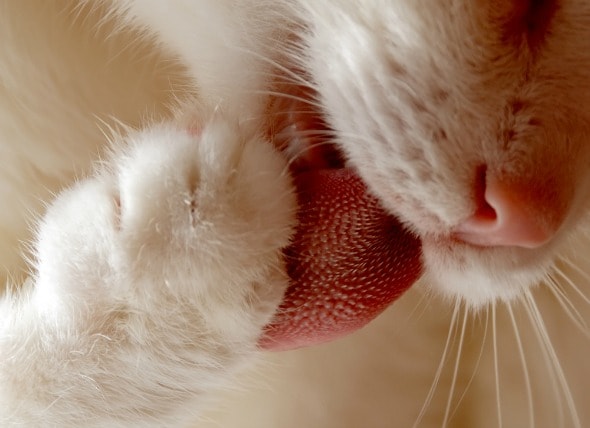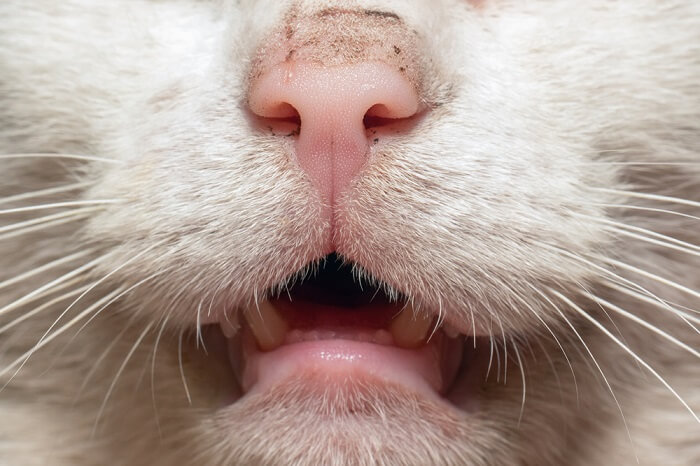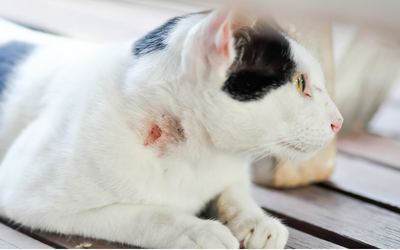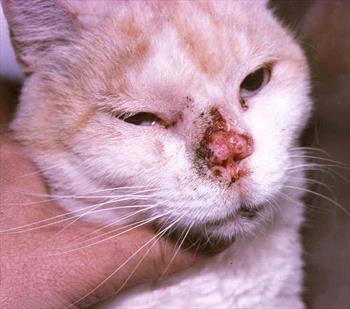sarcoma in cats jaw
Oral squamous cell carcinoma is cancer of the lining of the oral cavity including the gingiva gums tongue palate and tonsils. There are different forms of sarcoma that develop in cats.

Common Oral Tumors In Cats And Dogs Vet In Aurora The Animal Dental Clinic
The histiocytic type of skin mast cell tumor in cats is seen primarily in Siamese cats younger than 4 years old.

. Cats tolerate chemotherapy much better than humans do although. The whole episode started right around Christmas when he was showing signs of bad pain. Lameness that doesnt go away and swelling of the affected bone.
Tumors are locally invasive and can extend into the bones of the upper or lower jaw. Lymphoma Blood cancer most often affecting the intestines lymph nodes nasal cavity kidneys or liver. Feline sarcoma also known as soft tissue sarcoma is a type of cancer that develops in the connective tissues in petsAlthough these soft tissue tumors can arise anywhere in the cats body they commonly develop on the skin or subcutaneously.
Jaw If the cancer is affecting the jaw you might notice they are having trouble opening their mouth and eating or lots of saliva in their mouth. Difficulty chewing if the cancer is in the jaw. Osteosarcoma osteogenic sarcoma is an aggressive and destructive type of primary cancer that develops in the bones.
After many visits it was discovered that the lump was actually some sort of tumor but the vet wouldnt know exactly which kind without a biopsy. Fibrosarcomas arise from the connective tissues within the mouth often from the jaw bones. Osteosarcomas can also develop in the skull most commonly in the oral cavity pelvis ribs and vertebrae.
A cats mouth similar to our own is made up of several different cell types. Benign jaw tumors and cysts include. Vet bills can sneak up on you.
Nerve sheath tumor previously called neurofibrosarcoma schwannoma hemangiopericytoma Rhabdomyosarcoma. These are the most common symptoms when a tumor affects. They present as a subcutaneous beneath the skin lump and are malignant tumors arising from transformed cells.
Squamous cell carcinoma a kind of skin cancer that most often. Metastasis to distant organs have not been reported in these dogs. Odontogenic tumors arise from the tissues making up the teeth.
Osteosarcomas arise solely from bony tissues such as the jaw bones. Symptoms How can you know if your cat has osteosarcoma. Squamous cell carcinoma - Squamous cells are the type of cells that form your pets skin.
Cancer arises from osteoblasts or osteoclasts which are cells that produce a matrix which builds or breaks down bone. Jan 12 2015. My cat Momo is 9 years old and has a tumor on his jaw.
In osteosarcoma and squamous cell carcinoma of the jaw pain is strongly marked. These jaw tumors grow from cells in the enamel that protects your teeth and often form near the wisdom teeth or molars. Causes Treatments Prevention and Tips.
Malignant tumors are dangerous because they are rarely accompanied by visible symptoms. Cats with osteosarcoma of the jaw a form of axial osteosarcoma may have swelling of the jaw difficulty opening the mouth excessive salivation and may be reluctant to eat due to pain. Swelling or a mass.
Tumors may develop anywhere on the body and appear as multiple small less than 04 inches 1 centimeter in diameter firm lumps under the skin surface. All of which can become cancerous eg skin cells bone cells fibrous cells. The symptoms of osteosarcoma in cats can be subtle and they may include.
The term soft-tissue sarcoma encompasses a broad category of tumors that show up in a cats connective muscle or nervous tissues. Some tumors may grow slowly and do not typically spread called benign while others will act aggressively called malignant. Cats are much less likely to be affected by this condition than dogs and approximately one-third of bone tumors found on cats are benign.
The tumor of the jaw at the beginning of its development manifests itself in the same way as the problems with teeth but can cost a cats life. Mouth cancer can be a tumor located anywhere within a cats oral cavity including the lips tongue cheeks roof of the mouth upper or lower jaw and back of the mouth. These cells also line interior passages of the respiratory and digestive tracts.
Cats with osteosarcoma of the jaw a form of axial osteosarcoma may have swelling of the jaw difficulty opening the mouth excessive salivation and may be reluctant to eat due to pain. What Kinds of Cancer Do Cats Get. Often the symptoms will depend on the area of the body the cancer is affecting.
Fractures these may occur when there has been little trauma to the bone or may be severe than one would normally expect. Bone tumors are growths commonly found on the leg bones of cats. It is the most common type of bone cancer in cats and accounts for 70 of bone tumours.
The rate of metastasis at the time of diagnosis is low. The two most common types of oral cancers that occur in cats include squamous cell carcinomas and fibrosarcomas. If an osteosarcoma develops elsewhere in the skull or vertebrae swelling and pain in the.
Bone Cancer in Cats. Bone Cancer in Cats. Other common causes of oral tumors in cats are fibrosarcomas osteosarcomas and odontogenic tumors.
When you look at them closely they have tiny lines resembling fish scales. Soft tissue sarcoma an aggressive malignant tumor that develops in fibrous connective tissue anywhere on the body sometimes at the site of an injection. Less often tumors can develop on the spine ribs pelvis shoulder blades and skull.
They can invade local. Although squamous cell carcinomas dont spread rapidly to other parts of the body oral tumors may be locally invasive and spread to the chest. Osteosarcoma osteogenic sarcoma is an aggressive and destructive type of primary.
These cells can develop cancer in your cats mouth or on her body. Older cats generally have fewer tumors. An oral tumor is an abnormal growth of cells.
It is the most common oral cancer in cats. This is often the first sign of. Cats suffering from oral tumors often develop jaw cancer or cancer in the oral cavity.
Sarcomas are a specific type of cancer. Mouth cancer is not connected to any breed age or sex of cat but experts believe second-hand smoke could contribute to its occurrence.

Tongue Cancer Squamous Cell Carcinoma In Cats Petmd

Cancerous And Non Cancerous Growths In A Cat S Mouth Petmd

Mouth Cancer Gingiva Squamous Cell Carcinoma In Cats Petmd

Oral Squamous Cell Carcinoma In Cats An Overview Vet In Aurora The Animal Dental Clinic

Feline Fibrosarcoma Bluepearl Pet Hospital

Mouth Cancer In Cats Causes Symptoms Treatment All About Cats

Feline Oral Squamous Cell Carcinoma An Overview

Abscesses In Cats Vca Animal Hospitals

Mouth Cancer Melanocytic In Cats Petmd

The Pet Oncologist Vet Oncologist Online Oral Cancer In Cats

Coping With Cat Cancer Symptoms And Advice Blue Cross

Nasal Squamous Cell Carcinoma In Cats Veterinary Partner Vin

Oral Tumors In Dogs And Cats Paws Into Grace
/GettyImages-11673268481-ff230807a7e04e2db8e38e148edb19a5.jpg)
How To Treat Fibrosarcomas In Cats

Learn About Oral Cancers In Cats Petcure Oncology

Common Causes And Treatment For Sneezing In Cats Firstvet

Adopt Tori Senior Declawed Cat Offered By Owner On Petfinder Kitten Adoption Cat Adoption Cats

